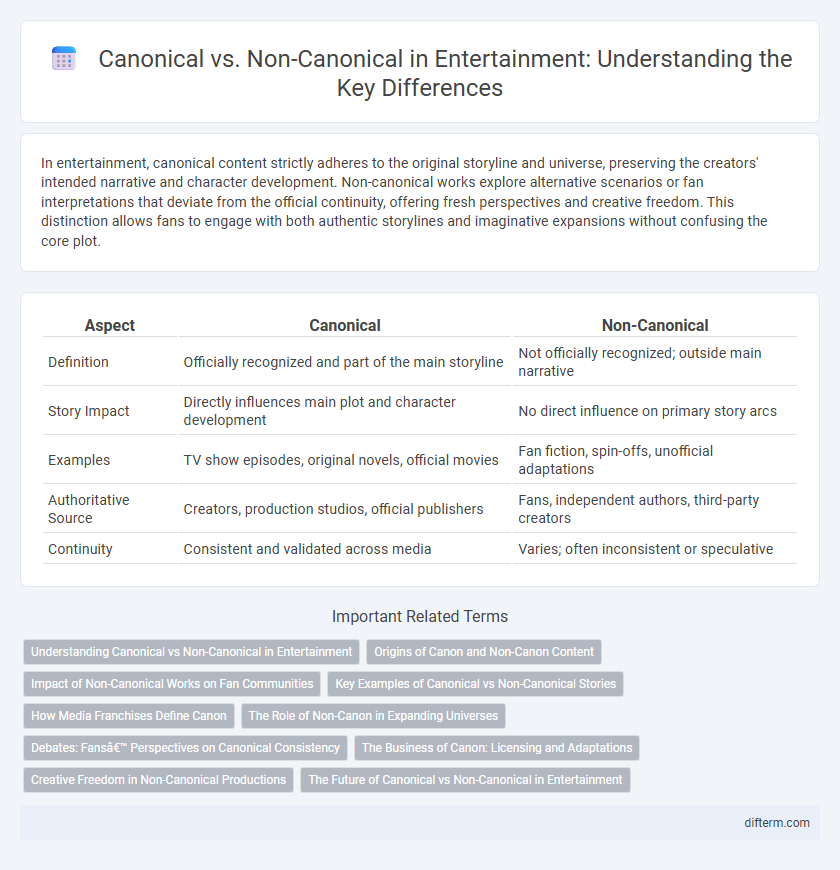In entertainment, canonical content strictly adheres to the original storyline and universe, preserving the creators' intended narrative and character development. Non-canonical works explore alternative scenarios or fan interpretations that deviate from the official continuity, offering fresh perspectives and creative freedom. This distinction allows fans to engage with both authentic storylines and imaginative expansions without confusing the core plot.
Table of Comparison
| Aspect | Canonical | Non-Canonical |
|---|---|---|
| Definition | Officially recognized and part of the main storyline | Not officially recognized; outside main narrative |
| Story Impact | Directly influences main plot and character development | No direct influence on primary story arcs |
| Examples | TV show episodes, original novels, official movies | Fan fiction, spin-offs, unofficial adaptations |
| Authoritative Source | Creators, production studios, official publishers | Fans, independent authors, third-party creators |
| Continuity | Consistent and validated across media | Varies; often inconsistent or speculative |
Understanding Canonical vs Non-Canonical in Entertainment
Understanding canonical vs non-canonical in entertainment involves distinguishing officially recognized storylines and characters from unofficial or fan-created content. Canonical works are established by the original creators or rights holders, shaping the primary narrative and continuity within a franchise. Non-canonical material includes alternate versions, spin-offs, or fan fiction that explore different possibilities without affecting the main storyline.
Origins of Canon and Non-Canon Content
Canon content refers to the officially recognized storyline and elements established by original creators or rights holders, ensuring consistency within a fictional universe. Non-canonical content includes fan theories, parodies, and spin-offs that explore alternative narratives without affecting the core storyline. The origins of canonical content stem from authoritative sources like original works or designated sequels, while non-canon often arises from fan interpretations, expanded universes, or unofficial media.
Impact of Non-Canonical Works on Fan Communities
Non-canonical works, such as fan fiction, spin-offs, and alternate universe stories, significantly influence fan communities by expanding the original narrative and encouraging creative participation. These works foster diverse interpretations and emotional connections, often leading to vibrant discussions and fan-driven content creation across social media platforms and fan conventions. The impact of non-canonical stories reshapes collective fan identity and sustains engagement long after official series conclusions.
Key Examples of Canonical vs Non-Canonical Stories
Canonical stories in entertainment, such as the official Marvel Cinematic Universe films, establish the main storyline recognized by creators and fans, while non-canonical stories like alternate reality comics or fan fiction explore imaginative possibilities without impacting the official plot. Key examples include the Star Wars movies as canonical works, contrasted with the Star Wars Expanded Universe novels, many of which are now considered non-canonical "Legends." The distinction informs fan engagement and franchise development, guiding which narratives shape the official lore versus those that offer creative variations.
How Media Franchises Define Canon
Media franchises define canon by establishing a core set of narratives and characters considered official within the universe, often determined by original creators or authorized sources. Canon influences fans' understanding of storylines and continuity, maintaining consistency across various media like films, books, and games. Non-canonical content, such as fan fiction or alternative interpretations, exists outside this official framework and does not affect the primary story arc established by the franchise.
The Role of Non-Canon in Expanding Universes
Non-canon works play a crucial role in expanding entertainment universes by exploring alternative storylines and character developments that official canon may not address. These non-canonical narratives, including fan fiction, spin-offs, and alternate reality episodes, provide creative freedom and deepen fan engagement by offering fresh perspectives. While they do not alter the established continuity, non-canon content enriches the universe's complexity and keeps audiences invested beyond the main storyline.
Debates: Fans’ Perspectives on Canonical Consistency
Debates over canonical versus non-canonical content often highlight fans' fierce dedication to maintaining narrative consistency within a franchise's established universe. Canonical works are valued for preserving continuity, while non-canonical elements spark controversy by introducing contradictions or alternative interpretations. These disputes underscore the importance fans place on authenticity and coherence in storytelling across media like films, books, and video games.
The Business of Canon: Licensing and Adaptations
The business of canon in entertainment hinges on licensing agreements that define authorized adaptations, ensuring story consistency and brand integrity. Canonical works are often closely controlled by rights holders to maintain narrative coherence across films, series, and merchandise, driving sustained fan engagement and revenue. Non-canonical adaptations, while creatively flexible, usually lack official approval, limiting their market impact and influence on the primary storyline.
Creative Freedom in Non-Canonical Productions
Non-canonical productions offer unmatched creative freedom, allowing creators to explore alternative storylines, character developments, and settings without the constraints of established lore. This flexibility encourages innovative storytelling and attracts diverse audiences seeking fresh perspectives beyond the original canon. Such productions often serve as experimental platforms that expand the franchise's universe while preserving the integrity of the official narrative.
The Future of Canonical vs Non-Canonical in Entertainment
The future of canonical versus non-canonical narratives in entertainment hinges on audience engagement and content adaptation, with canonical stories maintaining brand integrity through official narrative continuity. Non-canonical works, such as fan fiction, spin-offs, and alternate universes, offer creative freedom that fuels fan interaction and cultural expansion. Emerging technologies like virtual reality and interactive storytelling are blurring the lines, enabling both canonical and non-canonical content to coexist and enrich the entertainment landscape.
canonical vs non-canonical Infographic

 difterm.com
difterm.com